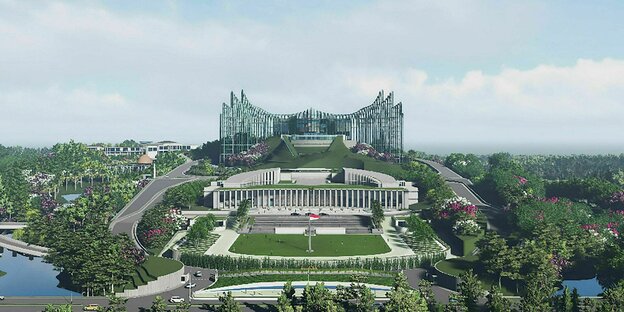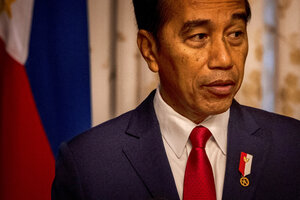New capital, new palace: Indonesian President Joko Widodo likes to make big plans. He will not be allowed to run again in the next election.

Computer generated simulation of the future presidential palace Photo: Nyoman Nuarta Brochure/afp
JAKARTA taz | The side wings of the new presidential palace symbolize the powerful wings of the Garuda, the mythical eagle-shaped heraldic bird of Indonesia. This extravagant building with a metal and glass façade is currently being built in the province of East Kalimantan, on the island of Borneo, 1,350 kilometers and one hour of time difference northeast of the former capital, Jakarta. Outgoing president Joko Widodo, whom everyone calls Jokowi, named the new capital Nusantara (“Archipelago”). She will be his monument.
The area, once characterized by plantations and jungle, is now dominated by excavators, cranes and unfinished buildings. 100,000 workers are building streets and buildings from the ground. Joko Widodo wants to inaugurate the hilltop palace in central Nusantara on Independence Day, August 17. The first 1,800 officials will then move from Jakarta; The goal is for 60,000 people to live in Nusantara by the end of the year.

This text comes from Laborable day. Our left-wing weekly! Every week, wochentaz is about the world as it is and as it could be. A left-wing weekly with a voice, attitude and a special vision of the world. New every Saturday on newsstands and of course by subscription.
The city, praised by the president as a “green and smart global city,” is scheduled to be completed in 2045, marking Indonesia's centenary. At 2,562 square kilometers, Nusantara could be four times larger than Jakarta; The metropolis currently has 10 million inhabitants and 30 million in its surroundings. Two million people are expected to live in Nusantara, in a 100 percent climate-neutral city where only electric vehicles are used. 75 percent of the area should be forests, nature reserves and agricultural land. This is the plan that Joko Widodo has promoted.
His successor will be elected in Indonesia next Wednesday and a second round is possible in June. The Constitution prohibits the 62-year-old president from running for a third term. Widodo's desire for this irritated many and also failed his own party.
Strong desire for power.
The lust for power of the president, who took office in 2014 as an unconventional reformer from humble origins, first a furniture maker, then mayor of the provincial city of Surakarta and later governor of Jakarta, became increasingly pronounced. in his second term. Joko Widodo has thus alienated many members of the democracy movement who once supported him. However, almost ten years after taking office, his popularity rating remains at 70 percent.
The idea of moving the capital from the heavily dominant island of Java dates back to Indonesia's founding president, Sukarno. In addition to a fairer distribution of economic power, political influence and population growth, Jakarta's decline also speaks to this. The water needs of the metropolis cause the water table, and with it the city built on alluvial soil, to drop between 1 and 24 centimeters per year, depending on the location. At the same time, sea levels are rising as a result of climate change.
Now, the presidential election on February 14 will decide what will happen to the new capital when Joko Widodo ceases to be its driving force in October. There are three candidates in the world's third largest democracy: Defense Minister Prabowo Subianto, favored by Jokowi, and Ganjar Pranowo, former governor of Central Java, are in favor of the construction of Nusantara and the capital move, the former minister and former governor of Jakarta. Anies Baswedan has big concerns.
Anies Baswedan noted in a television debate that one of Prabowo's companies held licenses for several hundred thousand hectares of land near Nusantara. Kalimantan needs more than just a capital: “Many schools need to be renovated, there are no railway lines or highways between cities, farmers lack fertilizers… And we are building a palace for the president?” she criticized.
The president's favorite project
To make it more difficult to abandon his pet project and give security to investors, the president had Parliament enshrine Nusantara into law. Eight out of nine parties voted in favor, only the Islamists voted against. Now you support Anies Baswedan. Joko Widodo promised that the state would cover only a fifth of Nusantara's costs with the equivalent of $35 billion. The rest should come from private investors.
Some Indonesian conglomerates and state-owned companies are also there. Meanwhile, local indigenous communities, who often do not have land titles, fear evictions and environmentalists fear deforestation and the destruction of nature. But Nusantara lacks foreign investors. According to the business journal Asian Nikkeis Japanese companies had looked in Kalimantan, but had not signed any contracts. And Japan's Softbank, with its largest technology fund in the world, quickly withdrew.
Potential investors are apparently speculating on more advance payments from the state. Above all, they are waiting for the elections. Joko Widodo has so far achieved success in investment. “His positive legacy from him is the big infrastructure projects. His government has built many roads, bridges, airports, ports and railway lines,” said Andreas Harsono, Indonesia researcher at Human Rights Watch. The new infrastructure would largely pay for itself despite rising debt, Harsono says. However, the $7.8 billion Chinese-built Jakarta-Bandung express train line is a problem. As costs rose, Beijing demanded guarantees from Jakarta. Now the project is generating large deficits at the expense of the State.
Critics fear something similar will happen in Nusantara. The gigantic project could hardly be cancelled, but perhaps it could be reduced to a provincial capital. “I don't think much about Nusantara at all. This will cost Indonesia dearly,” says Franz Magnis-Suseno. The 87-year-old theologian and social philosopher has lived in Indonesia since 1961, is a long-time citizen of the country and is a well-known commentator. He has personally experienced every president in the country.

Joko Widodo, president of Indonesia since October 2014 Photo: Ezra Acayan/Reuters
Family dynasty: the son at play
“Sukarno was very cocky, while Suharto knew his weaknesses. Jokowi is a smart Javanese power politician,” says Franz Magnis-Suseno. “He doesn't hit the table with his fist, but listens, wraps around his opponents and suddenly has them all in his pocket without humiliating them.” He explains the popularity with which the president now influences the elections: that despite feints, he governed Indonesia “in peace and without crisis.” It’s calm and you can feel comfortable under it.”
With the help of his brother-in-law, who presided over the Constitutional Court, Joko Widodo suddenly made his eldest son, Prabowo, a vice presidential candidate in October. The former general is accused of serious human rights violations during Suharto's government. Prabowo lost two elections to Joko Widodo.
But he brought him into his government as defense minister after Prabowo's supporters incited violent protests following his election defeat. Now, through Jokowi's son, Prabowo could benefit from the current president's popularity and perhaps win in the first round of voting.
Many see this move by Joko Widodo as the beginning of a family dynasty. The Constitutional Court, created in the reform phase (“Reformasi”) after the Suharto dictatorship, was damaged. It thus shares the fate of other institutions of the Reformasi era that have now been weakened to defend democratic rights, such as anti-corruption or electoral authorities.
“We were shocked,” says activist Natalia Soebagjo, from the electoral monitoring organization Jaga Pemilu. “And now, under Jokowi, state resources are being misused for the election campaign. We encourage everyone to report violations without fail.”
Democracy and human rights
Harsono of Human Rights Watch says: “Ultimately, Jokowi was never about democracy and human rights.” In his second term, new laws again restricted freedom of expression, workers' and women's rights, indigenous land rights, and environmental protection.
For Joko Widodo the only thing that mattered was the stabilization of his government and now the continuity of his influence. “That's what Prabowo's acceptance is for, which he now associates with the new capital.” No wonder Jokowi still wants to inaugurate the presidential palace in Nusantara himself.